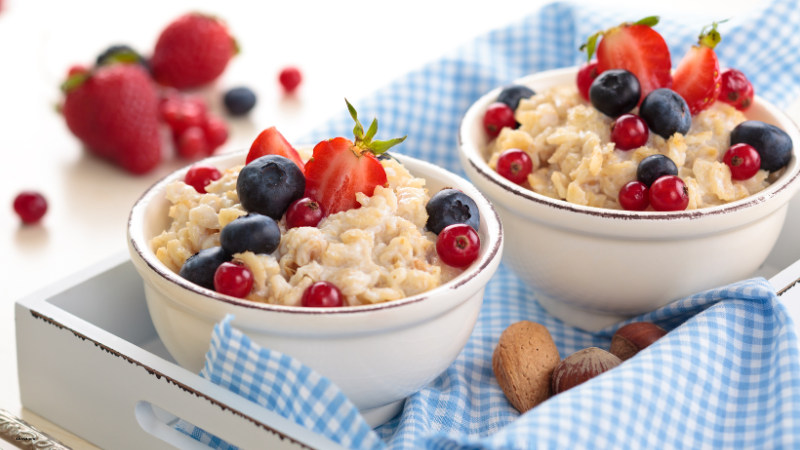Discover the Longevity Secret: How a Daily Bowl of Oatmeal Could Be Your Key to a Healthier, Longer Life
UC Davis Health reports that regular breakfast consumption has been linked to lower risks of type 2 diabetes, heart disease, and obesity. The healthcare provider, operated by the University of California, also notes that consuming a nutritious breakfast enhances cognitive performance, particularly in areas of memory and concentration. Recent studies have uncovered that oatmeal consumption may contribute to a longer life, highlighting the importance of oats nutrition and the numerous benefits of oatmeal for breakfast.
Fox News Digital consulted with two healthcare professionals regarding these findings. The research, published in the American Journal of Lifestyle Medicine, included observations of a centenarian who reached 105 years of age. According to Dr. Mike Sevilla, a family medicine practitioner at Salem Family Care in Salem, Ohio, this participant’s daily routine consistently included oatmeal consumption. (He wasn’t involved in the current research.)
“I recall another significant study from approximately a decade ago in the Journal of the American Medical Association, where participants who included oatmeal in their daily diet showed reduced rates of early mortality,” noted the physician. Additional research examining oatmeal’s health impacts demonstrates its potential to reduce cholesterol, particularly LDL cholesterol, and improve blood sugar regulation, potentially lowering risks of cardiac disease and diabetes, Sevilla added. These findings support the notion that oats are healthy and contribute to overall heart health.

Health benefits of oatmeal
Oatmeal stands out as an accessible, budget-friendly, and versatile breakfast option that can be enhanced with various toppings like fresh fruits, nuts, seeds, nut-based spreads, and aromatic spices. Here are four key health advantages of consuming oatmeal, addressing the question “what does oatmeal do for you?”
Oatmeal may decrease cholesterol and blood sugar
These health improvements typically reduce the likelihood of developing cardiac conditions and diabetes, according to Sevilla. “The underlying mechanisms appear to involve reduced cholesterol absorption and enhanced insulin sensitivity, which influences the body’s blood sugar levels,” he elaborated. The presence of beta-glucan, a soluble fiber in oats, plays a crucial role in these benefits.
Oatmeal may boost the immune system
This comforting morning staple could help strengthen your body’s defenses against seasonal illnesses. “Essential minerals such as selenium and copper enhance white blood cell function – cells crucial for fighting disease and infection,” reports Health Reporter, a medical information platform. The components in oatmeal can also enhance immune responses and “fight pathogens, eliminate foreign bodies, combat harmful bacteria, and prevent chronic conditions,” the platform states. Additionally, oats contain avenanthramides, unique antioxidants that help reduce inflammation.
Oatmeal can help with digestion
Beyond being a fulfilling and satisfying breakfast choice, oatmeal offers significant digestive health advantages. According to Brittany Kingry, a registered dietitian serving as director of dietetics at CoreLife Novant Health in Charlotte, North Carolina, oatmeal is an excellent source of soluble fiber. “The beta-glucans in oatmeal, a type of soluble fiber, dissolve in water and transform into a gel-like substance within your digestive system,” she explained to Fox News Digital.
This gel-like formation aids in slowing down digestion, promotes beneficial gut bacteria growth, and helps regulate blood glucose and insulin responses. Oatmeal’s high fiber content can also help prevent constipation and promote regular bowel movements, contributing to overall gut health.
Oatmeal is packed with essential nutrients
Starting your day with oatmeal can set a positive tone for your nutritional intake. “Oatmeal stands out as an exceptionally nutrient-rich food, containing an impressive array of vitamins and minerals including iron, zinc, phosphorus, magnesium, copper, folate, and various B vitamins, among others,” Kingry explained. This comprehensive nutrient profile contributes to the many health benefits of oats and explains why oatmeal is good for you.
Important considerations to keep in mind
While oatmeal presents numerous nutritional benefits as a breakfast choice, nutrition experts caution that excessive consumption may lead to certain drawbacks. Understanding these oatmeal benefits and disadvantages is crucial for making informed dietary choices.
“Despite oatmeal’s impressive benefits and fiber content, we must be mindful of both the quantity and variety of oatmeal we incorporate into our daily eating patterns,” Kingry emphasized.
Consider the following factors:
Oatmeal contains high carbohydrate levels
Kingry suggests incorporating protein into your morning meal to achieve a more balanced nutritional profile. “It’s essential to avoid consuming oatmeal in isolation; instead, pair it with protein sources to maintain stable blood sugar levels,” Kingry shared with Fox News Digital.
“This can be achieved by incorporating nuts, protein powder (with additional liquid to prevent graininess), or nut butter into your oatmeal, or by serving it alongside lean breakfast proteins.” This approach addresses the question “does oatmeal have protein?” while ensuring a balanced meal.
For individuals managing diabetes or insulin resistance, oatmeal might not be ideal due to its high carbohydrate content, according to Kingry. “These individuals might benefit more from prioritizing protein-rich foods in the morning, perhaps including a small half-cup portion of oatmeal as a side dish if desired,” she advised. It’s important to consider the glycemic index of oatmeal and its impact on blood sugar levels.
Excessive oatmeal consumption requires attention
Navigating oatmeal options at grocery stores requires careful consideration, Kingry noted. Be cautious of varieties containing “added sugars or sugar alternatives,” she warned. “The recommended approach is to select plain rolled oats to minimize sugar intake.”
Additionally, Kingry pointed out that while oats are naturally gluten-free, cross-contamination during processing or handling can occur. Therefore, those “seeking gluten-free options should carefully review labels for certified gluten-free products.”
Kingry advised following the recommended serving size (either one packet or half cup uncooked) specified on the product label. “It’s surprisingly easy to consume more than the recommended amount,” she warned. This is particularly important for those considering an oatmeal diet or using oatmeal for weight loss.
In conclusion, while the question “is oatmeal good for weight loss?” is often asked, it’s important to remember that oatmeal can be part of a healthy diet when consumed in moderation. Eating oatmeal daily includes improved heart health, better digestive health, and increased feelings of fullness and satiety, which can aid in weight control. However, what happens if you eat oatmeal every day depends on various factors, including portion size and overall diet composition. As with any dietary change, it’s best to consult a healthcare professional to determine if an oatmeal-rich diet suits your needs and health goals.
Source:
Erica Lamberg (22 January 2025). Eating this breakfast food could help you live longer, study suggests. https://nypost.com/2025/01/22/health/eating-this-breakfast-food-could-help-you-live-longer-study-suggests/. Accessed January 22, 2025
You may also like to read:
Study Explores Dogs Communication Button’ in Communication
Reviving Neutral Homes: Adding Color to Modern Interior Design
